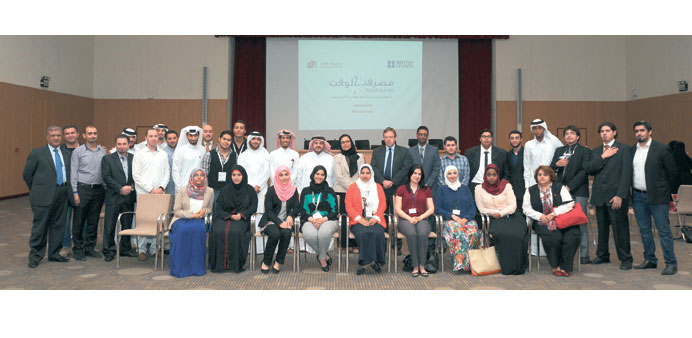The Time Bank team members are seen with Prof Sheikha al-Misnad, Ambassador O’Neill and senior officials of QU and the British Council.
By Bonnie James/Deputy News Editor
The Time Bank, a Qatari youth initiative handed over yesterday by the British Council to Qatar University’s Centre for Volunteerism and Civil Responsibility, is a novel concept that promotes volunteerism by imparting a financial sense to the value of time.
Linked to the British Council Global Changemakers project, described as a vibrant community of young activists, volunteers and social entrepreneurs from 128 countries, the virtual Time Bank allows youth to make “time deposits” by volunteering in various companies.
“For example, an individual who has volunteered for 10 hours will get a proportionate time deposit in his or her account and can convert it into a certificate or request the support of volunteers for 10 hours to work on his or her project,” implementation team head Ibrahim Alosta told Gulf Times.
The Time Bank, launched in 2010, now has 60 full-time members and more than 3,500 volunteers. They have delivered more than 60 workshops and 25 events including Planning Your Career, First Aid, Starting from Scratch, Emotional Intelligence, and Graphic Design.
Language Bridges with Vodafone, photography with Arabic Club, debating with Qatar Debates, tour guides with Msheireb’s Knowledge Enrichment Centre and volunteering for the Arab Games 2011 were also among the activities.
The Time Bank clients play different roles in activating the bank services, and can at any point change roles, such as funders, investors, donors, and volunteers. Funders are institutions that in collaboration with the British Council provide youth with opportunities to volunteer.
Investors are youth who would like to invest the time - they earned from volunteering – in Time Bank accounts to be redeemed for recognition certificates or in the form of support - for their own initiatives - from other volunteers.
Donors are youth who want to contribute to positive social change by imparting their skills or knowledge in specific sectors to other youth.
The Time Bank aims to empower youth to undertake effective actions and build capacity in different sectors, build networks of youth and funders, and provide youth with future career opportunities as well as prospects to build their CVs.
It is also intended to influence partner institutions corporate social responsibility in facilitating support for youth, and enhance awareness about the importance of social and voluntary work, develop time ethics, and responsibility of youth.
Initiative to empower Qatari youth to catalyse positive social change
The Time Bank, a Qatari youth initiative linked to the British Council Global Changemakers project, was formally handed over yesterday to Qatar University’s Centre for Volunteerism and Civil Responsibility.
The global youth network of social entrepreneurs, community activists and advocates between the ages of 16 and 25, aims to empower youth to catalyse positive social change by providing them with skills, contacts, opportunities and a community of like-minded people pursuing the same goals.
“Funded and supported by the British Council since 2010, the Time Bank project has now become self-sustaining and grown to include 60 full-time members and more than 3,500 volunteers,” British Ambassador Michael O’Neill said at a ceremony held at QU.
Describing the Time Bank as a “very important example of collaboration between the UK and QU”, the envoy stressed he was keen to strengthen the partnership between QU and the British Council.
He lauded the young Qataris who have contributed time as volunteers to the Time Bank programme, and congratulated them and the British Council on the programme’s success. “It is excellent that Qatar University is now taking over responsibility for Time Bank, to provide a Qatari home for this important element of the country’s future development. This is a very positive example of the kind of partnership between our countries that we are celebrating and seeking to build further this year as we celebrate Qatar UK 2013.
“The next stage of development will be the visit of 10 Time Bank members to the UK, to take part in a capacity building programme with the British Youth Council,” the ambassador added.
The trip is being co-funded by Qatar Foundation’s Social Development Centre 2011 Volunteer Award (for the best project in Qatar) and QU.
QU Student Activities director Al Jazzi Hamad Fetais observed that the Time Bank project helps develop students’ skills, especially leadership and social responsibility.
The Time Bank director Majd al-Shibli explained that the project has attracted a number of donors and funders, has run more than 60 workshops for members who also participated in more than 25 community events.
The implementation team head Ibrahim Alosta said that the Time Bank’s vision was to build by 2015 the largest interactive network of individuals and organisations in Qatar to maximise the value of time.
“The Time Bank envisages to build a network of dynamic youth who are eager to utilise their time effectively,” maintained implementation team member Rawan Hassanein.
QU President Professor Sheikha Abdulla al-Misnad expressed her delight that the varsity has been chosen as the new home for Time Bank.
“The British Council has supported the development of young Qataris for the last two years, and they are now ready to take the next steps of their journey. The Time Bank project is an inspiration and an example of positive activism, not only for youth but for various segments of society. I hope this project will inspire further collaborative initiatives in the future.”
In a message, the British Council in Qatar director, Martin Hope, described Time Bank as an excellent example of how the British Council works with partners to develop sustainable projects which have long-term impact.
“Qatar University is an excellent partner, and we welcome their support for this project, which will enable these dynamic young people to continue their efforts to develop themselves and their communities.”

